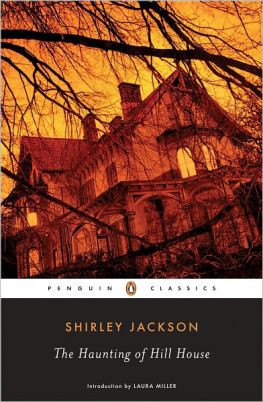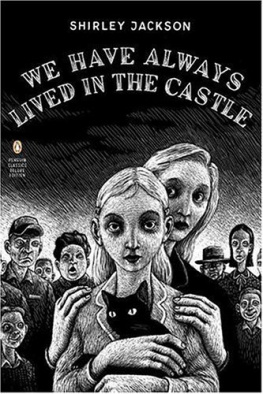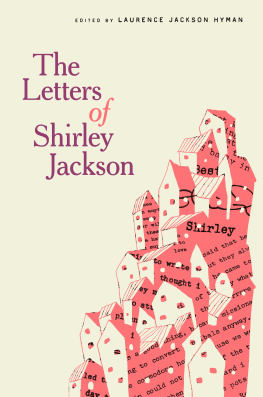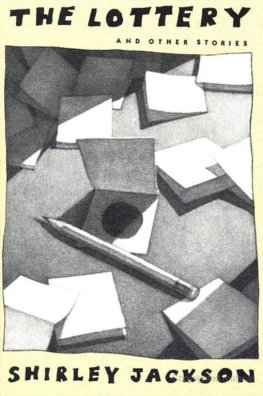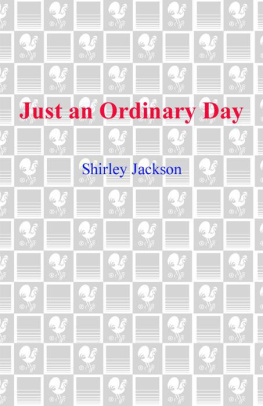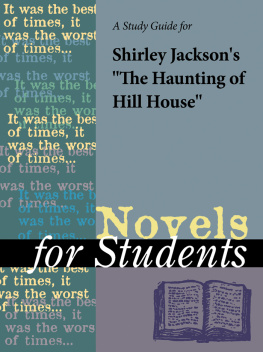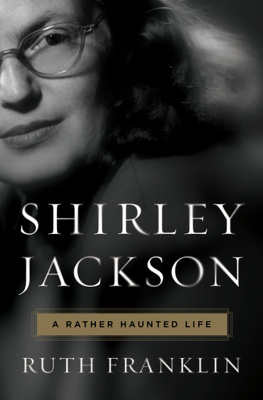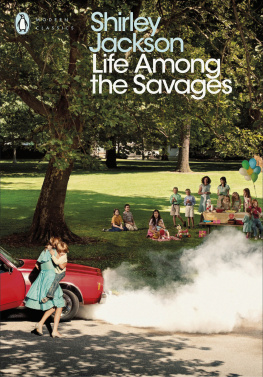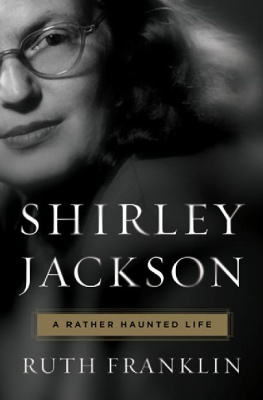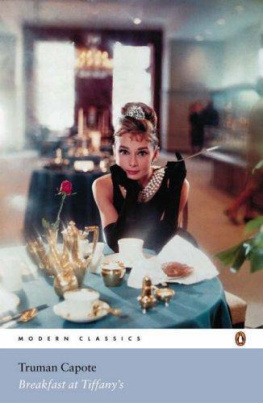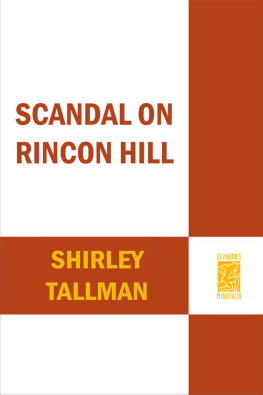PENGUIN

CLASSICS
THE HAUNTING OF HILL HOUSE
SHIRLEY JACKSON was born in San Francisco in 1916. She first received wide critical acclaim for her short story The Lottery, which was published in 1949. Her novelswhich include The Sundial, The Birds Nest, Hangsaman, The Road through the Wall, and We Have Always Lived in the Castle (Penguin), in addition to The Haunting of Hill House (Penguin)are characterized by her use of realistic settings for tales that often involve elements of horror and the occult. Raising Demons and Life Among the Savages are her two works of nonfiction. Come Along With Me (Penguin) is a collection of stories, lectures, and part of the novel she was working on when she died in 1965.
LAURA MILLER is a journalist and critic living in New York. She is a cofounder of Salon.com, where she is currently a staff writer, and a regular contributor to the New York Times Book Review. Her work has appeared in the New Yorker, Los Angeles Times, Time magazine, and other publications. She is the editor of The Salon.com Readers Guide to Contemporary Authors (Penguin, 2000).
No live organism can continue for long to exist sanely under conditions of absolute reality; even larks and katydids are supposed, by some, to dream. Hill House, not sane, stood by itself against its hills, holding darkness within; it had stood so for eighty years and might stand for eighty more. Within, walls continued upright, bricks met neatly, floors were firm, and doors were sensibly shut; silence lay steadily against the wood and stone of Hill House, and whatever walked there, walked alone.
Dr. John Montague was a doctor of philosophy; he had taken his degree in anthropology, feeling obscurely that in this field he might come closest to his true vocation, the analysis of supernatural manifestations. He was scrupulous about the use of his title because, his investigations being so utterly unscientific, he hoped to borrow an air of respectability, even scholarly authority, from his education. It had cost him a good deal, in money and pride, since he was not a begging man, to rent Hill House for three months, but he expected absolutely to be compensated for his pains by the sensation following upon the publication of his definitive work on the causes and effects of psychic disturbances in a house commonly known as haunted. He had been looking for an honestly haunted house all his life. When he heard of Hill House he had been at first doubtful, then hopeful, then indefatigable; he was not the man to let go of Hill House once he had found it.
Dr. Montagues intentions with regard to Hill House derived from the methods of the intrepid nineteenth-century ghost hunters; he was going to go and live in Hill House and see what happened there. It was his intention, at first, to follow the example of the anonymous Lady who went to stay at Ballechin House and ran a summer-long house party for skeptics and believers, with croquet and ghost-watching as the outstanding attractions, but skeptics, believers, and good croquet players are harder to come by today; Dr. Montague was forced to engage assistants. Perhaps the leisurely ways of Victorian life lent themselves more agreeably to the devices of psychic investigation, or perhaps the painstaking documentation of phenomena has largely gone out as a means of determining actuality; at any rate, Dr. Montague had not only to engage assistants but to search for them.
Because he thought of himself as careful and conscientious, he spent considerable time looking for his assistants. He combed the records of the psychic societies, the back files of sensational newspapers, the reports of parapsychologists, and assembled a list of names of people who had, in one way or another, at one time or another, no matter how briefly or dubiously, been involved in abnormal events. From his list he first eliminated the names of people who were dead. When he had then crossed off the names of those who seemed to him publicity-seekers, of subnormal intelligence, or unsuitable because of a clear tendency to take the center of the stage, he had a list of perhaps a dozen names. Each of these people, then, received a letter from Dr. Montague extending an invitation to spend all or part of a summer at a comfortable country house, old, but perfectly equipped with plumbing, electricity, central heating, and clean mattresses. The purpose of their stay, the letters stated clearly, was to observe and explore the various unsavory stories which had been circulated about the house for most of its eighty years of existence. Dr. Montagues letters did not say openly that Hill House was haunted, because Dr. Montague was a man of science and until he had actually experienced a psychic manifestation in Hill House he would not trust his luck too far. Consequently his letters had a certain ambiguous dignity calculated to catch at the imagination of a very special sort of reader. To his dozen letters, Dr. Montague had four replies, the other eight or so candidates having presumably moved and left no forwarding address, or possibly having lost interest in the supernormal, or even, perhaps, never having existed at all. To the four who replied, Dr. Montague wrote again, naming a specific day when the house would be officially regarded as ready for occupancy, and enclosing detailed directions for reaching it, since, as he was forced to explain, information about finding the house was extremely difficult to get, particularly from the rural community which surrounded it. On the day before he was to leave for Hill House, Dr. Montague was persuaded to take into his select company a representative of the family who owned the house, and a telegram arrived from one of his candidates, backing out with a clearly manufactured excuse. Another never came or wrote, perhaps because of some pressing personal problem which had intervened. The other two came.
2
Eleanor Vance was thirty-two years old when she came to Hill House. The only person in the world she genuinely hated, now that her mother was dead, was her sister. She disliked her brother-in-law and her five-year-old niece, and she had no friends. This was owing largely to the eleven years she had spent caring for her invalid mother, which had left her with some proficiency as a nurse and an inability to face strong sunlight without blinking. She could not remember ever being truly happy in her adult life; her years with her mother had been built up devotedly around small guilts and small reproaches, constant weariness, and unending despair. Without ever wanting to become reserved and shy, she had spent so long alone, with no one to love, that it was difficult for her to talk, even casually, to another person without self-consciousness and an awkward inability to find words. Her name had turned up on Dr. Montagues list because one day, when she was twelve years old and her sister was eighteen, and their father had been dead for not quite a month, showers of stones had fallen on their house, without any warning or any indication of purpose or reason, dropping from the ceilings, rolling loudly down the walls, breaking windows and pattering maddeningly on the roof. The stones continued intermittently for three days, during which time Eleanor and her sister were less unnerved by the stones than by the neighbors and sightseers who gathered daily outside the front door, and by their mothers blind, hysterical insistence that all of this was due to malicious, backbiting people on the block who had had it in for her ever since she came. After three days Eleanor and her sister were removed to the house of a friend, and the stones stopped falling, nor did they ever return, although Eleanor and her sister and her mother went back to living in the house, and the feud with the entire neighborhood was never ended. The story had been forgotten by everyone except the people Dr. Montague consulted; it had certainly been forgotten by Eleanor and her sister, each of whom had supposed at the time that the other was responsible.
 CLASSICS
CLASSICS
